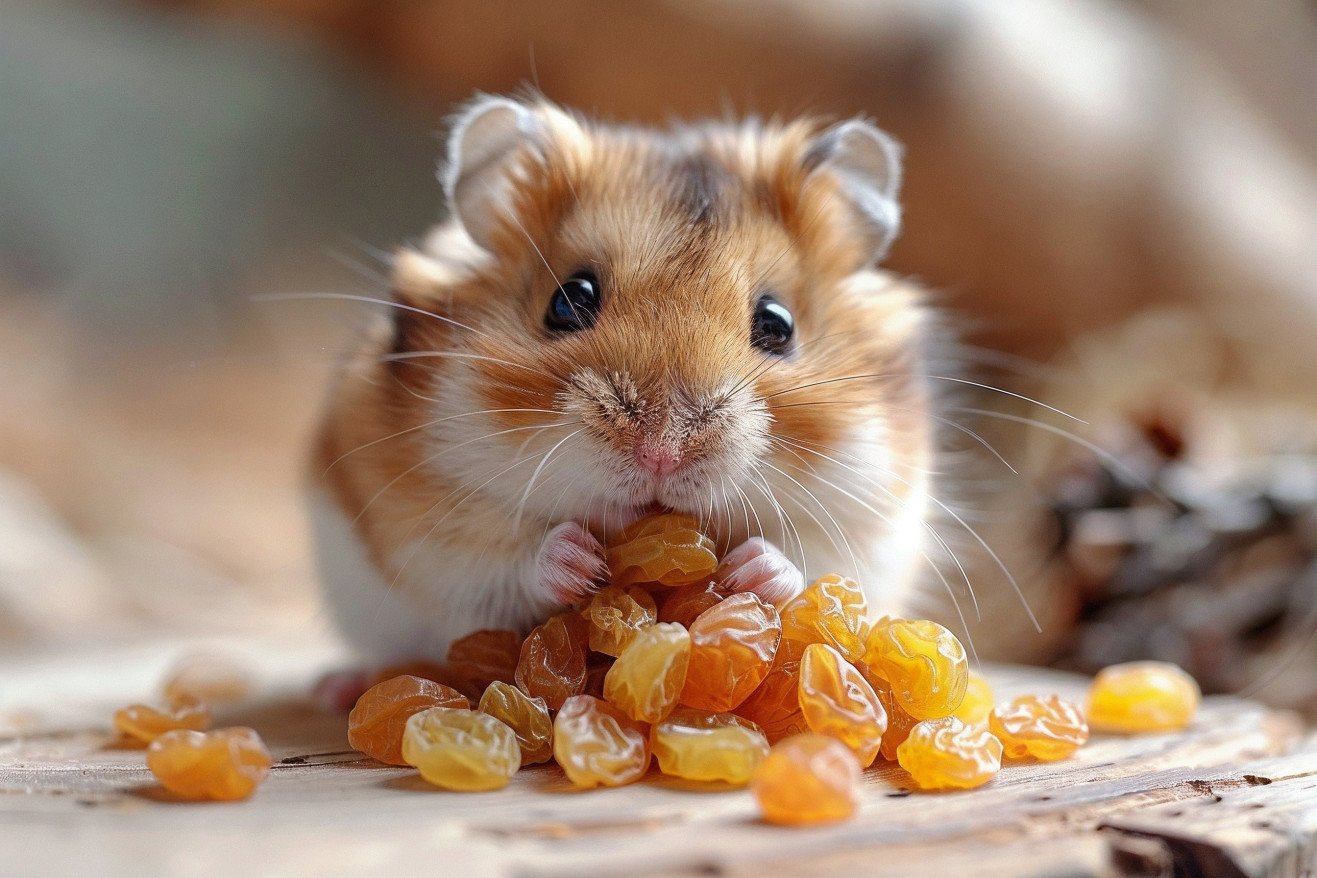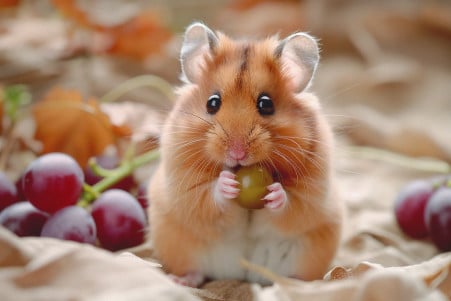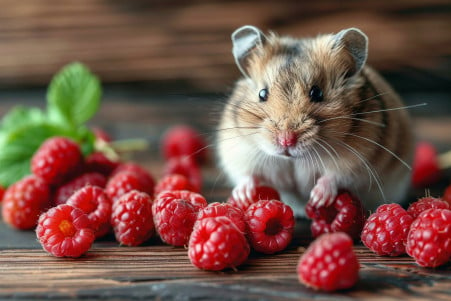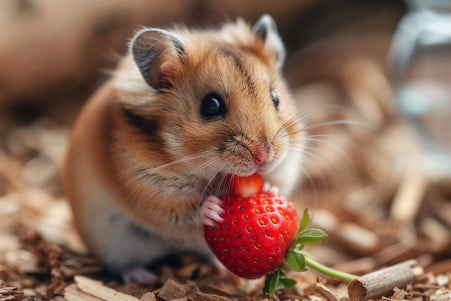Can Hamsters Eat Raisins? Exploring the Risks and Benefits
1 June 2024 • Updated 31 May 2024

Hamsters, like many other small animals, can eat raisins, but it's important to know what else they should be eating and the potential downsides of feeding them dried fruit. Raisins are high in sugar and should be limited to no more than 10% of a hamster's diet, which should be made up mostly of a seed/grain mix and some fresh vegetables. Because of the sugar, feeding hamsters too many raisins can cause obesity, diabetes, and dental problems. You should only feed your hamster 1-2 raisins a week as a treat.
This article will review the information provided by veterinarians and hamster owners to help you better understand what hamsters should be eating. By learning about the nutritional value of raisins and the risks associated with feeding them to hamsters, you can make sure you're keeping your pet healthy while still giving them a fun treat every once in a while.
Can hamsters eat raisins?
How to Introduce New Foods: Take It Slow
When it comes to introducing new foods like raisins, it’s important to take a slow approach to avoid digestive issues. As explained in The First 30 Days With Your Pet Hamster, sudden dietary changes can lead to stomach problems, so start by giving your hamster a small amount of the new food and see how they react over the next few days before increasing the portion.
It takes about 10 days for a hamster to get used to a new food, according to the same source, so feed your hamster small pieces of the new food mixed in with their regular pellets and sprinkle some around their cage to encourage foraging, as suggested by WikiHow.
Because sudden dietary changes can cause stress and other issues for hamsters, Hunthaz recommends introducing one new food at a time and then waiting a few days before introducing another. However, if you take a slow approach and pay attention to how your hamster reacts, you can successfully introduce healthy treats like raisins into their diet.
A Balanced Diet: Important Nutrients for Hamsters
Since hamsters are omnivores, they need a varied diet to get all the nutrients they need. According to Petco, the bulk of a hamster's diet should be made up of high-quality pellets or a seed/grain mix, which will provide the necessary proteins, fats, and carbohydrates.
Hamsters should also be fed fresh vegetables, such as leafy greens, carrots, and broccoli, which should account for about 20% of their diet, according to The Spruce Pets. Small amounts of fresh fruits, like apples, bananas, and berries, can also be given as treats.
In order to make sure that a hamster's diet is well-rounded, Pet Health Network recommends offering additional protein sources, like cooked eggs or lean meats. This mix of nutrients is important for a hamster's overall health and happiness.
How to Practice Portion Control With Your Hamster
Hamsters eat very little and only need a few teaspoons of food each day. According to How Much Do Hamsters Eat? | Feeding Your Hamster | Hamsters | Guide, a good rule of thumb is 1-2 teaspoons of dry food per day for adult hamsters, with dwarf hamsters needing a little less. The Ontario Hamster Club suggests using a "portion" that's the size of your hamster's ear when it comes to fresh foods.
You should also watch how much your hamster is eating and adjust their portions as needed to avoid overfeeding or underfeeding. How Much Do Hamsters Eat? says that if you notice that there's a lot of dry food in your hamster's bedding, you're probably feeding them too much. Pregnant and nursing hamsters will need more food, including more protein, to meet their nutritional needs.
When it comes to fresh foods, make sure that you're only giving your hamster small amounts of fruits and vegetables, as overfeeding them can lead to weight gain. The Ontario Hamster Club has a great list of fruits and vegetables that are safe for hamsters to eat. By keeping a close eye on portion sizes and how much your hamster is eating, you can make sure that they're getting the right amount of food and that they're not at risk for any dietary issues.
How to Tell If Your Hamster Is Malnourished or Sick
If your hamster is not eating, has lost weight, or has a poor coat, these are signs of malnutrition or illness, according to the Clarington Animal Hospital. Diarrhea, lethargy, and decreased activity are also signs of potential health problems, according to Healthy Pet.
Pregnant hamsters may have smaller litters or be infertile due to age or malnutrition, according to the Merck Veterinary Manual. Meanwhile, vitamin E deficiency can cause muscle disorders, paralysis, and weak or stillborn babies in hamsters, the same source says. Mite infestations and patchy hair loss can also be due to diet deficiencies or malnutrition.
It’s important to keep a close eye on your hamster’s health and take them to the vet at the first sign of any health problems. Knowing what to look for in terms of malnutrition and disease can help you make sure that your hamster is as healthy as possible by feeding them a balanced diet and providing them with an enriching living environment.
How to Make Feeding More Enriching
Scatter your hamster's food around the cage or hide it in paper bags, tubes, or boxes to encourage natural foraging behavior, as suggested by PDSA. To promote dental health, you can also give your hamster untreated softwood branches, coconut shells, or cardboard, according to the same source.
In addition to the staple diet, Small Pet Select recommends rotating through different types of healthy treats, such as hay cubes or mini cookies, to make sure that your hamster's diet is as varied and enriched as possible. Pet Supplies Plus also suggests offering fresh fruits and vegetables in different forms, such as sliced, grated, or whole, to keep your hamster's diet interesting and mentally stimulating.
Conclusion: Moderation and Balance Are Key to Hamster Health
Raisins can be a healthy and fun treat for your hamster as long as they are given in moderation and as part of a balanced diet. Hamsters should primarily eat high-quality pellets or seed mixes, but they can also enjoy fresh fruits, vegetables, and the occasional protein. However, overeating raisins and other dried fruits can lead to obesity, diabetes, and dental problems, so it's important to control portion sizes.
When introducing new foods, make sure to do so slowly, watch your hamster's response, and adjust portion sizes as needed to make sure the transition goes smoothly. By making sure your hamster has a diverse and stimulating diet and a clean and stimulating living environment, you can help ensure that your hamster stays healthy and happy.


